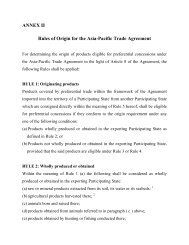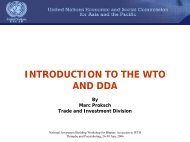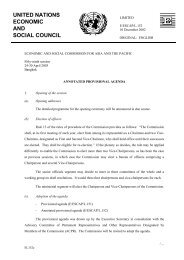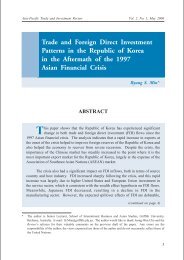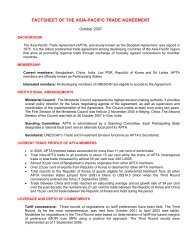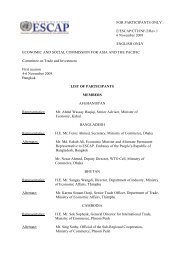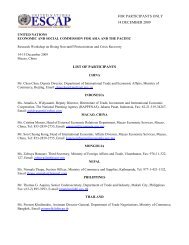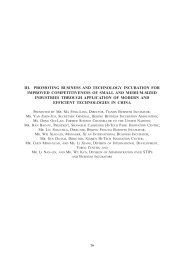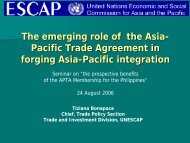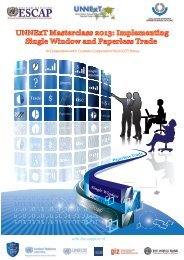country studies on bangladesh, nepal and sri lanka - Escap
country studies on bangladesh, nepal and sri lanka - Escap
country studies on bangladesh, nepal and sri lanka - Escap
Create successful ePaper yourself
Turn your PDF publications into a flip-book with our unique Google optimized e-Paper software.
STUDIES IN TRADE AND INVESTMENT 70<br />
tremendous potential in that respect, should be supported at both regi<strong>on</strong>al <strong>and</strong> global<br />
levels. 2<br />
Within this c<strong>on</strong>text, <strong>on</strong>e of the most important challenges facing SMEs in South<br />
Asia is creating new business opportunities, targeting the foreign markets. Establishing<br />
effective linkages with global <strong>and</strong> regi<strong>on</strong>al markets, including those of major emerging<br />
ec<strong>on</strong>omies in Asia <strong>and</strong> the Pacific, such as China <strong>and</strong> India, is a major challenge for SMEs.<br />
However, recent experiences from a wide range of countries in Asia <strong>and</strong> the Pacific do<br />
indicate that SMEs could access internati<strong>on</strong>al markets through global (<strong>and</strong> regi<strong>on</strong>al)<br />
value chains (GVCs). They could build efficient networks by establishing linkages with<br />
large enterprises or even with other SMEs. Such integrati<strong>on</strong> in GVCs are expected to<br />
help boost SMEs’ value added activities in internati<strong>on</strong>al trade, in which SMEs, at present,<br />
play a limited role due to a lack of proper networking. In particular, the proposed shift<br />
would immediately help smaller ec<strong>on</strong>omies in South Asia, such as Bangladesh, Nepal<br />
<strong>and</strong> Sri Lanka, in accelerating their socio-ec<strong>on</strong>omic development <strong>and</strong> poverty reducti<strong>on</strong>.<br />
It should also be noted that the emergence of GVCs has intensified competiti<strong>on</strong><br />
in value added activities <strong>and</strong> required c<strong>on</strong>tinuous skill development. Such competiti<strong>on</strong><br />
could lead to greater ec<strong>on</strong>omic <strong>and</strong> development disparities in South Asia at both the<br />
company <strong>and</strong> <str<strong>on</strong>g>country</str<strong>on</strong>g> levels, unless nati<strong>on</strong>al policymakers in cooperati<strong>on</strong> with business<br />
practiti<strong>on</strong>ers <strong>and</strong> internati<strong>on</strong>al development agencies create a business envir<strong>on</strong>ment<br />
for the succesful integrati<strong>on</strong> of SMEs in GVCs.<br />
Addressing key policy issues for export-driven SMEs in South Asian developing<br />
countries, the Trade <strong>and</strong> Investment Divisi<strong>on</strong> of ESCAP devised a project to explore new<br />
ways <strong>and</strong> means <strong>and</strong> provide effective tools for SMEs integrati<strong>on</strong> into global <strong>and</strong><br />
regi<strong>on</strong>al markets through participati<strong>on</strong> in global <strong>and</strong> regi<strong>on</strong>al value chains.<br />
The introducti<strong>on</strong> presents all four key topics. The first secti<strong>on</strong> discusses research<br />
framework, including value chain analysis, research objectives <strong>and</strong> methodology. The<br />
sec<strong>on</strong>d secti<strong>on</strong> reviews the existing SME development approaches of different d<strong>on</strong>or<br />
agencies, while the third secti<strong>on</strong> briefly describes the recent key developments in the<br />
business community in Asia <strong>and</strong> the Pacific, particularly the emergence of global <strong>and</strong><br />
regi<strong>on</strong>al value chains. The final secti<strong>on</strong> explains the overall structure of the publicati<strong>on</strong>.<br />
1.1. Research framework<br />
2<br />
The study was c<strong>on</strong>ducted as part of ESCAP initiatives <strong>on</strong> Business for<br />
Development, a comprehensive programme for private sector development in Asia <strong>and</strong><br />
the Pacific. It was designed as a pilot project adapting value chain analysis to addressing<br />
possible areas of policy interventi<strong>on</strong>s for strengthening export- led SME development<br />
strategy in South Asia. The next secti<strong>on</strong> of the chapter provides a brief outline of the<br />
value chain analysis.<br />
2<br />
While reviewing the prospects for SMEs it should be noted that there are a number of bilateral<br />
<strong>and</strong> multilateral agencies involved in developing the private sector in South Asia (e.g., ADB 2000;<br />
GTZ 2010; JICA 2006; UNDP 2007; UNIDO 2010; USAID 2010; <strong>and</strong> World Bank 2002), which often focus<br />
<strong>on</strong> SME development.



